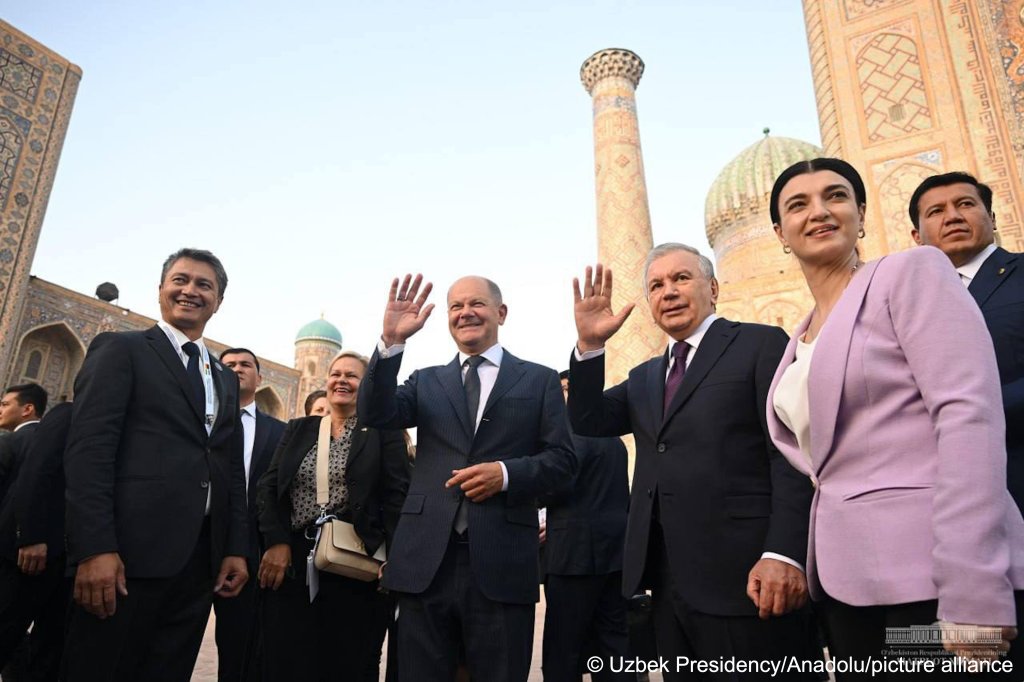Germany’s Chancellor Scholz returns to Germany on Tuesday after a three-day trip through Central Asia. Among the deals he signed in Uzbekistan and Kazakhstan were ones relating to migration. The media speculated this was all about making sure that Afghan criminals could be sent back via a third country.
"We are aiming to make it easier for skilled workers to come and offer their talents to Germany as we need them, in order to make sure that our economy grows," said Germany’s Chancellor Olaf Scholz at a press conference during the trip, reported the weekly newspaper Die Zeit.
In exchange, added Scholz, "we are going to simplify the process, make it less bureaucratic in order to send those back to their countries who must be returned."
This, said Scholz, "is an important part of a larger picture. It is one brick in a bigger wall that we need to erect." Scholz refused to comment during the trip about whether or not the Uzbek migration deal also contained the possibility of Germany being able to send Afghan criminals back to Afghanistan via a neighboring third country.
Also read: Deportations of Afghans via Tashkent under review
More return flights to Afghanistan planned for criminals
Germany’s Interior Minister Nancy Faeser accompanied Scholz on the trip. When asked by journalists about the German government’s intentions to return more Afghans, following several fatal knife incidents in Germany this summer involving migrants and asylum seekers, she answered: "Yes, I am planning more return flights to Afghanistan, for those with serious criminal convictions. But we still need to see with which countries we will cooperate to make that happen."

In August, one return flight to Afghanistan took off from Germany. This flight was negotiated via the Gulf state Qatar, while Germany doesn’t have any direct diplomatic contact with the Taliban regime in Kabul.
Scholz told the German TV Channel Phoenix that he was pleased to have signed the agreement in the Uzbek city Samarkand, "an historical site on the ancient trading route known as the Silk Road."
The German leader said that Uzbekistan was an important partner for Germany and held a strategic place in the world of the future. Scholz also admitted that because of Uzbekistan’s proximity to Afghanistan, it was a theme that his government had discussed during the trip, along with Russia’s attack on Ukraine.
Also read: What do Germany's migration partnerships entail?
Bilateral agreements part of wider 'pattern'
He said that via the bilateral agreements between Germany and Uzbekistan, he hoped the country would continue on its way to further democratization. Scholz admitted, in answer to a question from a journalist, that the migration agreement in itself with Uzbekistan would not see many people being sent back to Uzbekistan, simply because the numbers of Uzbeks coming to Germany and then being refused asylum are relatively few.
According to the Swiss newspaper Neue Zürcher Zeitung (NZZ), there are currently around 200 Uzbek nationals in Germany who have received a deportation notice in Germany, that's fewer than 0.01 percent of the total. However, Scholz said it was one of many agreements that follow a pattern, and together create a greater whole.

He also hinted that there had been "confidential discussions in several different areas" between the German delegation and its Afghan counterparts. He suggested without stating clearly that that might include the possibility of sending Afghan criminals back to Afghanistan might take place in the future with the help of Uzbekistan.
Also read: Germany to sign migration deals with Kenya, Uzbekistan
'Concrete plans?'
According to the NZZ and the German news magazine Spiegel, Uzbekistan has been considered by Germany as a potential partner for enabling returns to Afghanistan since at least May.
A spokesperson for Germany’s opposition parties, the conservative CDU and CSU, told NZZ they are optimistic that the German Interior Minister will ensure that the return of criminals to Afghanistan is pursued "with all means necessary."
Spiegel reports that pro-return politicians might not be disappointed for long, with concrete plans already in place for organizing returns via Uzbekistan. The plan reportedly involves flying criminals from Afghanistan to Uzbekistan using the Afghan airline Kam Air, before transporting them to Kabul. Uzbek officials are said to be in contact with Taliban officials in Afghanistan.
The news magazine also mentions another scenario that would repeat the first return flight in August since Germany ceased to operate return flights in 2021 after the Taliban took power. That would suggest that a charter flight could be involved to fly convicted Afghan criminals from a city like Leipzig directly to the Afghan capital Kabul.
